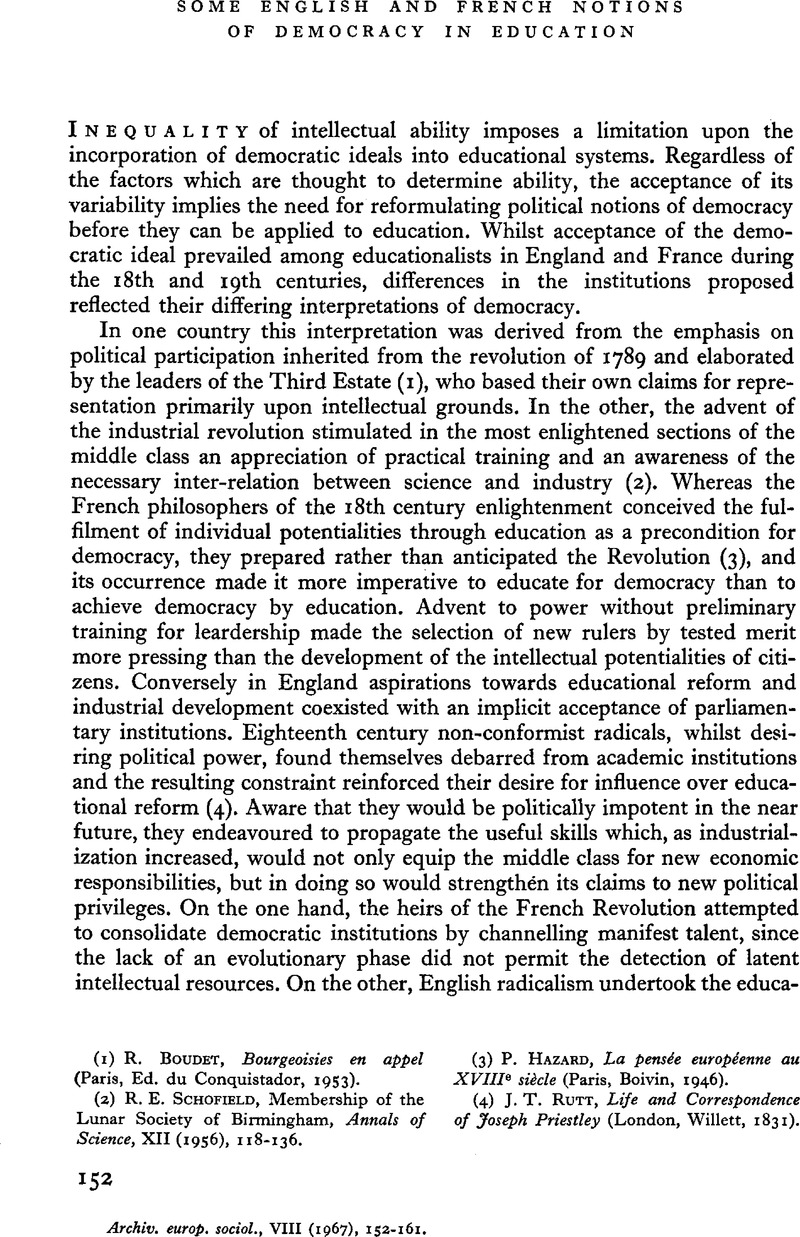No CrossRef data available.
Article contents
Some English and French Notions of Democracy in Education
Published online by Cambridge University Press: 28 July 2009
Abstract

- Type
- Notes Critiques
- Information
- European Journal of Sociology / Archives Européennes de Sociologie , Volume 8 , Issue 1 , May 1967 , pp. 152 - 161
- Copyright
- Copyright © Archives Européenes de Sociology 1967
References
(1) Boudet, R., Bourgeoisies en appel (Paris, Ed. du Conquistador, 1953).Google Scholar
(2) Schofield, R. E., Membership of the Lunar Society of Birmingham, Annals of Science, XII (1956), 118–136.CrossRefGoogle Scholar
(3) Hazard, P., La pensée européenne au XVIIIe siècle (Paris, Boivin, 1946).Google Scholar
(4) Rutt, J. T., Life and Correspondence of Joseph Priestley (London, Willett, 1831).Google Scholar
(5) Emery, L., L'université française et l'idéologie politique, in Le Contrat social, II (1958), 1–8.Google Scholar
(6) Mill, James, “On Education”, supplement to 5th edition of Encyclopaedia Britannica (London 1818).Google Scholar
(7) “This much at any rate is ascertained, that all the difference which exists or can be made to exist, between one class of men and another, is wholly owing to education” (quoted in Cavenagh, F. A., James and John Stuart Mill on Education (Cambridge, Cambridge University Press, 1931), p. 30.)Google Scholar
(8) Cf. Durkheim, E., Education et sociologie (Paris, Alcan, 1922), p. 150.Google Scholar
(9) de Loménie, E. Beau, Les responsabilités des dynasties bourgeoises (Paris, Denoël, 1934. 1947. 1954). 3 vols.Google Scholar
(10) 1850 Parliamentary Commission of J. Russell.
(11) Vial, F., Trots siècles d'histoire de l'enseignement secondaire (Paris, Delagrave, 1936), pp. 189 sqq.Google Scholar
(12) Cf. R. L. and Edgeworth, M., Practical Education (London, Johnson, 1801).Google Scholar
(13) E. g. R. L. Edgeworth, after unsuccessfully trying Rousseau's methods, outlined in L'Émile, on his son, rejects the postulate of natural virtue and development.
(14) Instinctual psychological theories were rejected in favour of the associationalist psychology of David Hartley. “The most important application of Doctor Hartley's doctrine of the association of ideas is to the conduct of human life, and especially to the business of education” (Priestley, J., An examination of Dr. Reid's Inquiry into the Human Mind on the Principles of Common Sense (London, Willett, 1774).Google Scholar
(15) For a historical account of écoles centrales, see Vial, F., op. cit.Google Scholar
(16) Cf. Lacroix, S. F., Essais sur l'enseignement en général et sur celui des mathématiques en particulier (Paris, Bachelier, 1828).Google Scholar
(17) Cf. Vial, F., Condorcet et l'éducatios démocratique (Paris, Mellotée, n. d.).Google Scholar
(18) « II faut done que chacun trouve dans les écoles centrales les ressources nécessaires pour arriver bien préparé aux écoles spéciales de ces différents états » (de Tracy, Destutt, Observations sur le système actuel d'instruction publique (Paris 1795), p. 10).Google Scholar
(19) McIachlan, J., English Education under the Test Acts (Manchester, Manchester University Press, 1931).Google Scholar
(20) For teaching purposes, Bentham systematized knowledge into an “encyclopaedic table” arranged from the simple to the complex. Topics and subjects were allocated priorities according to the joint, principles of utility and facility.
(21) Cf. Chavanon, C., «L'administration dans la société française» in Aspects de la société française (Paris, Siegfried, 1954).Google Scholar
(22) Cf. Weill, G., Histoire de Venseignement secondaire en France, 1802–1920 (Paris, Payot, 1921).Google Scholar
(23) Hignette, Marcel, “The Primacy of the Rational in French secondary Education” in World Yearbook of Education (London, Evans, 1958), pp. 233–242.Google Scholar
(24) Cf. Leif, J. and Rustin, G., L'histoire des institutions scolaires (Paris, Delagrave, 1954).Google Scholar
(25) Cf. Liard, L., L'enseignement supérieur en France, 1789–1889 (Paris, Colin, 1888–1894), 2 vols, tome II, p. 73.Google Scholar
(26) Cf. Clifford-Vaughan, M., Enlightenment and Education, British Journal of Sociology, XIV (1963), 135–143.CrossRefGoogle Scholar
(27) Cf. Simon, B., Studies in the History of Education, 1780–1870 (London, Lawrence and Wishart, 1960).Google Scholar
(28) Cf. Halévy, E., La formation du radicalisme philosophique (Paris, Alcan, 1901), tome II, p. 156.Google Scholar
(29) Cf. Smith, Adam, An Enquiry into the Nature and Causes of the Wealth of Nations (London, Strahan and Cadell, 1793)Google Scholar, tome V, Ier chapitre.
(30) Cf. Gellner, E., Thought and Change (London, Weidenfield and Nicolson, 1964).Google Scholar
(31) Cf. Kay-Shuttleworth, J., The Moral and Physical Conditions of the Working Class in Manchester in 1832 (London, Ridgway, 1832).Google Scholar
(32) Cf. Mack, E. C., Public Schools and British Opinion (London, Methuen, 1938, 1941), 2 vols.Google Scholar
(33) “The words arithmetic and Latin should be graven on the heart of every grammar school master. The one represents the primary conditions of popularity with the commercial class; the other the wicket gate through which must pass every boy, not endowed with special gifts or the subject of some unconvenanted mercies” (T.H. Green, quoted by Bantock, G. H., Education in an Industrial Society (London, Faber, 1963).Google Scholar
(34) Report of the Schools Enquiry Commission (the Taunton Commission), vol. I (1868).
(35) Arnold, M., Culture and Anarchy (New York, Cambridge University Press, 1960).Google Scholar
(36) Cf. Goblot, E., La barrière et le niveau, étude sociologique de la bourgeoisie moderne (Paris, Alcan, 1930).Google Scholar
(37) Cf. Peyrefitte, A., Rue d'Ulm (Paris, Flammarion, 1963).Google Scholar
(38) Chapman, B., The Profession of Government (London, Allen and Unwin, 1959).Google Scholar
(39) Chavanon, C., op. cit.Google Scholar
(40) Cf. Pernoud, Régine, Histoire de la bourgeoisie en France (Paris, Seuil, 1962), tome II.Google Scholar
(41) Cf. Bottomore, T. B., La mobilité sociale dans la haute administration française, Cahiers internationaux de sociologie, XIII (1952), 167–178Google Scholar; and Chapman, B., op. cit.Google Scholar
(42) Cf. Thomson, D., Democracy in France since 18704 (London, Oxford University Press, 1964).Google Scholar
(43) Cf. Brindillac, Charles, Les hauts fonctionnaires, Esprit, XXI (1953), 862–877.Google Scholar


